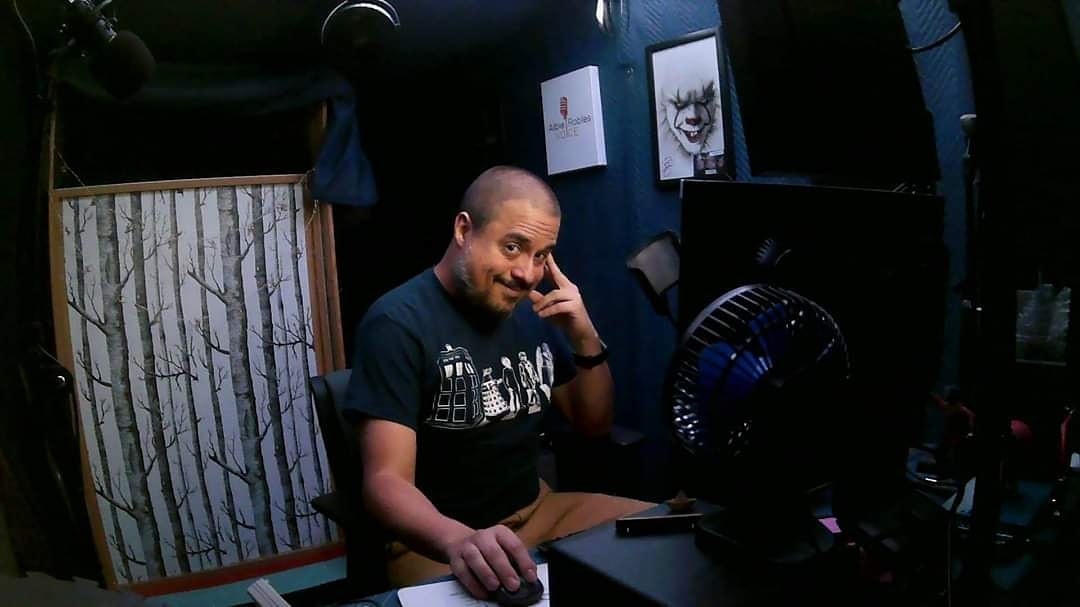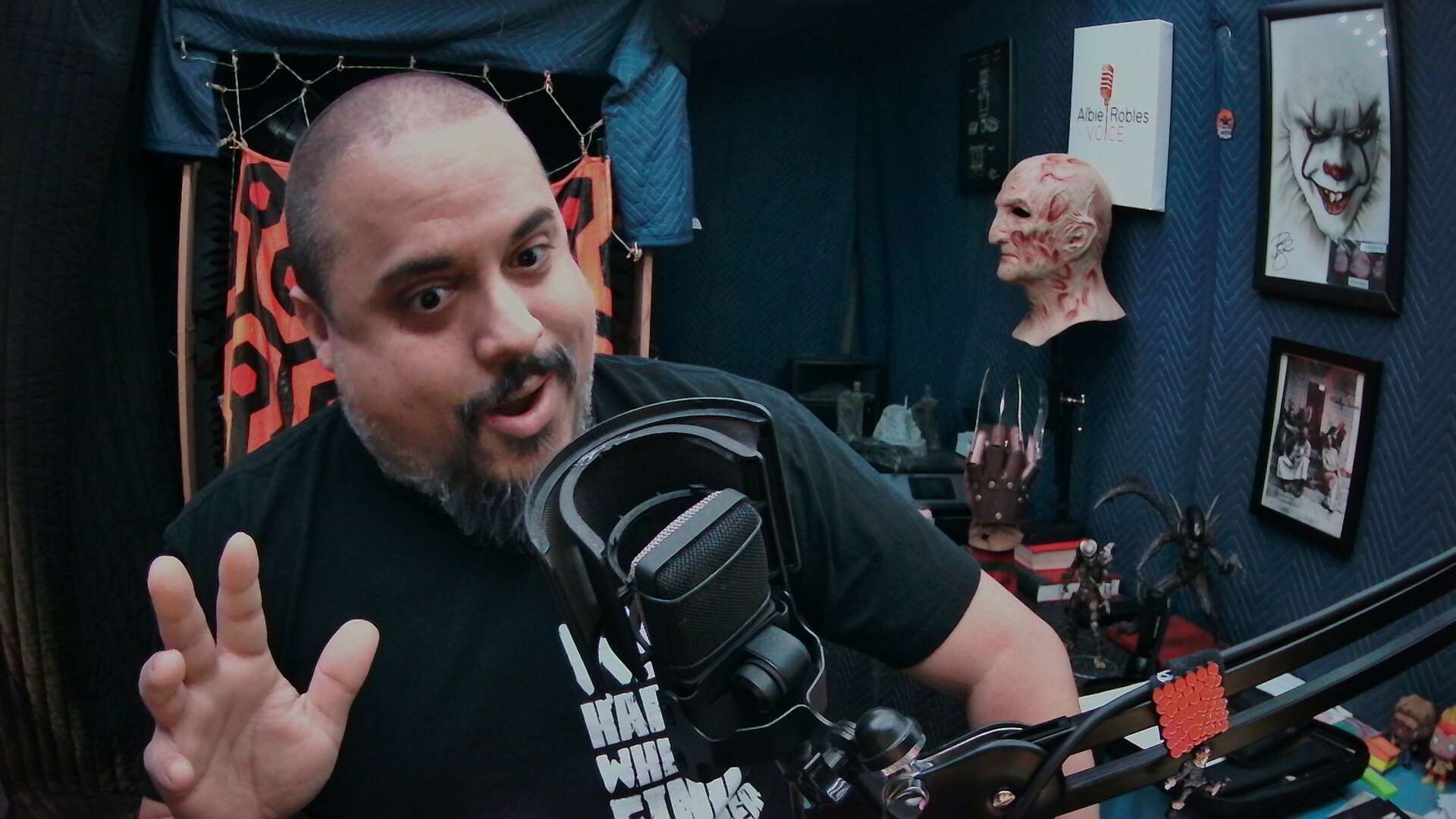We were lucky to catch up with Albie Robles recently and have shared our conversation below.
Hi Albie, thanks for joining us today. When did you first know you wanted to pursue a creative/artistic path professionally?
Every time I’d hear a radio ad or an audiobook I would think about how cool it must be if your job was to be one of those voices. It sounded like an amazing thing to do.
However, I didn’t ever consider actually doing it. I always thought there was no sense in pursuing it. That there was a small, elite handful of people that did it and there was no getting in for anyone else.
The last few years I started getting depressed. I used to act on stage when I was younger. People told me I was great. I loved it. I also play music. Guitar, piano, and harmonica. Sometimes, though, creative people need an outlet, and we want to entertain others. I didn’t have that. I was about to turn 40 last year. Between work and family, I couldn’t take the time to regularly rehearse with a band, or for a play.
I had a discussion about it with my wife. I told her I was becoming depressed. That on top of not having a creative outlet, I was past the point of starting a career in a creative field. I didn’t know how wrong I was, of course. We prayed about it. I needed direction.
Less then two weeks later I answered the phone at work and the person at the other end said, “Whoah, you should be doing voice work!”
The timing couldn’t have been better. As Stephen King wrote in Apt Pupil about finding your great interest, “It was like a key turning in a lock”.


As always, we appreciate you sharing your insights and we’ve got a few more questions for you, but before we get to all of that can you take a minute to introduce yourself and give our readers some of your back background and context?
I provide character voices for animation, video games, and film. I also provide narration for corporate videos, commercials, and audiobooks.
After realizing this is what I needed to do with my life, I fully committed, and went all in. I hit the ground running, learning everything I could. Researching. Honing skills. Acquiring equipment. Building a home studio.
I started out recording in the bedroom closet using a microphone that was plugged directly into my phone. Any time I would get some paid work, I would immediately invest it into improving my gear. Eventually I saved enough to get a voiceover coach for some formal training.
Little by little I improved my recording method, and eventually converted a room in the house into a studio.
I have a background in theater, and in improv. These allow me to be able to connect with what I am reading, which gives each client an end-product that sounds genuine.
The most defining moments in my career so far have been the times I’ve gotten jobs and opportunities that I had previously thought were out of reach. I did jobs for Ubisoft, Motorola, and Icy Hot.
The most surreal one was being asked to be a guest at San Angelo Comic Con. What an amazing experience!
What’s a lesson you had to unlearn and what’s the backstory?
What I had to unlearn was not a lesson, but an expectation, or rather, a series of them.
Most people going into this field expect it to be easy. Fortunately, I knew going in it wouldn’t be. Most of the job is marketing and looking for work. The recording part itself isn’t easy either. You need to understand mic technique. You need to learn about using an interface and editing software. In most cases, you are expected to process and engineer the audio before delivering it to the client, so you have to learn that too.
Another expectation is getting rich and famous through voice acting. Yes, there is a lot of work out there, but most of what pays well is corporate work. If you want to make a living through voice acting, you need to be open to that.


Let’s talk about resilience next – do you have a story you can share with us?
A huge requirement for this field, is emotional resilience. You come in with this idea that you’re going to start booking work right away. You learn quickly that you don’t get most of what you audition for. You are usually not told when you don’t get something.
You have to learn to not take it personally. Not getting a job does not mean you didn’t do well. It just means that your voice is not the voice they have in mind for that particular job.
If you don’t get used to this quickly, it can really feel like you’re always taking a beating. Some people end up not being able to understand this concept. They chalk it off to not being good enough and quit.
Lastly, there is never a point where you can stop learning, training, and improving. Everyone who is succeeding in this field is doing exactly that. If you want to compete, it’s the only way to keep moving forward.
Contact Info:
- Website: http://www.albieroblesvoice.com/
- Instagram: https://instagram.com/AlbieRoblesVoice
- Facebook: https://facebook.com/AlbieRoblesVoice
- Linkedin: https://www.linkedin.com/in/albie-robles-voice/
- Twitter: https://twitter.com/albievoice
- Youtube: https://www.youtube.com/c/AlbieRoblesVoice
- Other: The Scare Me Podcast – http://www.scareme.albieroblesvoice.com/
Image Credits
Michael Steven Daughtry


